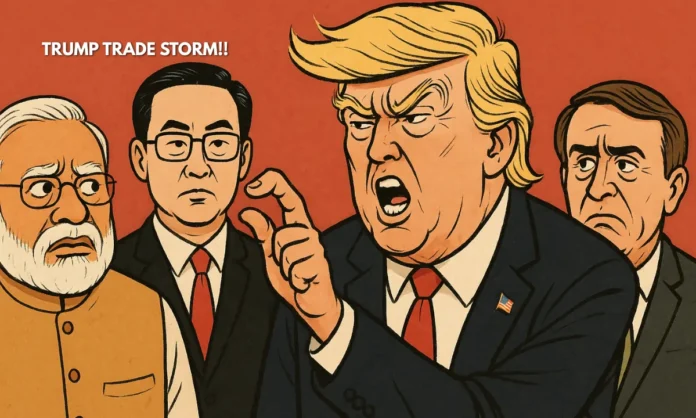Summary
- Chinese Ambassador on Trump tariffs publicly denounces U.S. policy, urging India to resist concede.
- The envoy asserts that tariffs undermine WTO norms and violate global cooperation principles.
- The development intensifies diplomatic strains as India braces for economic fallout amid 50% U.S. import duties.
Setting the diplomatic heat
The Chinese Ambassador on Trump tariffs took to social media on August 7, sharply responding to the United States’ sudden imposition of a 50% tariff on Indian imports. In a pointed post on X, Xu Feihong boldly warned, “Give the bully an inch, he will take a mile,” a clear reference to U.S. President Donald Trump’s aggressive policy. By invoking that metaphor, the Chinese Ambassador on Trump tariffs sought to rally solidarity with India and Brazil, both targeted by similar punitive measures.
Beyond the metaphor, the Chinese Ambassador on Trump tariffs reinforced his stand by quoting discussions between China’s Foreign Minister Wang Yi and Brazil’s Celso Amorim, emphasizing that “Using tariffs as a weapon to suppress other countries violates the UN Charter, undermines WTO rules and is both unpopular and unsustainable.”
Meanwhile, President Trump’s move to double tariffs—from a 25% “reciprocal” levy followed by another 25%—comes as a response to India’s continued purchases of Russian oil, further escalating geopolitical and economic friction.
"It's personal, not just about trade"- @Horror06 on #Trump & his unhinged tariff war; @AmbMoKumar says "Dont Confront, Dont Capitulate, Converse" & @Gen_RajShukla says "Hegemon may be retreating, US may not see India now as counterforce to China" -In full https://t.co/Dp4ETk7Vzb pic.twitter.com/I8t2YWvNQW
— barkha dutt (@BDUTT) August 7, 2025
Diplomatic undercurrents and regional responses
Several nations and institutions have quickly reacted to the intensifying trade war. India decried the new duties as “extremely unfortunate” and warned of severe economic repercussions—analysts estimate the tariffs could shave off up to 80 basis points from India’s GDP growth and make nearly $87 billion in U.S.-bound exports unviable.
The Chinese Ambassador on Trump tariffs is not alone in his stance. Back in April, the Chinese Embassy in India had urged unity between the two largest developing economies, noting that they should “stand together in face of U.S. tariffs.” Later, Xu stressed that China would not resort to market dumping to retaliate, reaffirming adherence to WTO rules and a shared path forward with India.
Speculation now abounds over India’s strategic choices. Despite the economic blow, Prime Minister Modi has signaled a readiness to “pay a very heavy price” in defense of the agricultural sector and India’s sovereign trade policy. The Guardian Calls to strengthen diplomatic resolve are also emerging in the U.S. — several House Foreign Affairs Democrats warn that Trump’s tariff “tantrum” could dismantle decades of careful U.S.-India partnership.
Amid mounting tensions, the Trump administration stated there will be no further trade talks with India until the tariff dispute is resolved.
Structural shocks and global implications
The Chinese Ambassador on Trump tariffs has cast this moment as more than a bilateral grievance—it’s poised as a symbolic challenge to international norms and multilateral structures. Trump’s tactics recall the sweeping tariffs announced under the “Liberation Day” executive order in April, which spurred a wave of legal pushback for exceeding executive authority under IEEPA, with courts invalidating several such measures.
His latest round on India underlines a pattern: deploying steep, retaliatory duties across multiple fronts—from steel and metals to energy and agricultural goods. The Chinese Ambassador on Trump tariffs frames this as coercive economic bullying, undermining institutions like the WTO and the UNC—a warning echoed in his statements and heartfelt in tone.
With India and Brazil standing as the freshly targeted economies, broader ramifications loom. Analysts caution that Trump’s policy may push India closer to China strategically or economically, even as Modi seeks to balance between major powers and prioritize domestic resilience.
A crossroads ahead
The Chinese Ambassador on Trump tariffs deliberately invoked solidarity with India and Brazil, positioning the move as a matter not only of trade, but of principle. His message—steeped in diplomacy and defiance—sets the tone for a pivotal phase in global trade dynamics.
India now stands at a crossroads: between de-escalating through concessions, doubling down via self-reliance, or exploring stronger alignment with Eurasian partners like China and Russia. Chinese overtures—including enhanced cooperation and shared resistance—suggest a readiness to shape this emerging alliance.
Meanwhile, in Washington, the broader strategy remains unclear: will this be a negotiation tactic leading toward a new bilateral deal, or an unyielding default in pursuit of strategic leverage? The Chinese Ambassador on Trump tariffs has framed this moment as a test of multilateral norms—one whose outcome may redefine alliances both regionally and globally.
Final Thoughts
The Chinese Ambassador on Trump tariffs has delivered far more than a rebuke—it is a call to principle and unity against coercive economic policy. As multiple nations recalibrate their diplomacies and trade structures, the repercussions of this moment could reverberate through global institutions and reshape allegiances for years to come.


